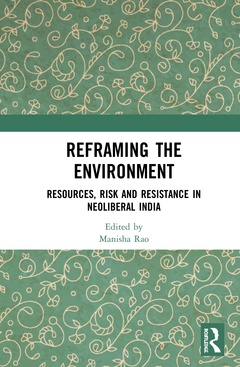Reframing the Environment Resources, Risk and Resistance in Neoliberal India
Coordonnateur : Rao Manisha

This volume unravels the underlying power relations that are masked in the present discourse of ecological sustainability and conflicts over natural resources. Current discussions on environment emphasise the use and abuse of the environment in various ways. This book looks at the inter-linkages of discourse, resources, risk and resistance in the contemporary neoliberal world. While exploring the experiences of neoliberalisation of nature in India, it brings out the intersections of conservation and management, science and gender, community politics and governance policies.
The volume highlights the cultural politics of resistance from multiple sites and regions in India in the recent context (be it land, water, forest, flora or fauna or urban commons). It discusses the ways in which environmental issues have come up and been appropriated, while examining the role of the State and actors such as corporates, traders, consultants, ecotourism companies, green activists and consumers, and consequences of ?green? appropriation and the ?growth? story. The major themes of the volume are the interrelations of nature, culture and power; neoliberal governance and the environment; access to and use and management of land, natural resources and environment; community politics and livelihoods; marginalised groups and local communities; marketisation and the environment; and new forms of re-appropriation and resistance.
This book will be of great interest to students and researchers in sociology, environmental studies, environmental history, environmental anthropology, political ecology, political science, geography, law and human rights, economics and development studies as well as to environmental activists, policy makers and those in media and journalism.
1. Understanding neoliberal environments in India: an introduction Manisha Rao PART I Neoliberal governance, environment and gender 2. Cutting the Gordian Knot: environmentalism, capitalism and the metabolic rift Sudha Vasan 3. Nature, nation, science and gender Gita Chadha 4. Building ‘India’s future powerhouse’: discourses of ‘development’ and popular resistance in Northeast India Chandan Kumar Sharma PART II Community, politics and livelihoods 5. Nilgiri Biosphere Reserve: reflections from the field Ritambhara Hebbar 6. New coastal claims and socio-legal contestations in Mumbai: artisanal fishers and the problematic of the urban environment D. Parthasarathy and Hemantkumar A. Chouhan 7. Bonds that divide: urbanisation and the erosion of the commons Hita Unnikrishnan, B. Manjunatha and Harini Nagendra PART III Marketisation and the environment 8. Playing with coloured spectacles: Neoliberal witchcraft as played out through watershed policies Arun De Souza 9. Canal commands and rising inequity Seema Kulkarni PART IV Law, politics and resistance 10. Rhinoceros in Kaziranga National Park: nature and politics in modern Assam Arupjyoti Saikia 11. Environmental movements and the Indian Supreme Court Geetanjoy Sahu 12. Wise sayings from an ‘ecosystem’ community: reflections from a search for challenging neoliberal worldviews on nature John Kurien
Manisha Rao is Assistant Professor at the Department of Sociology, University of Mumbai, India and previously taught at the Department of Sociology at SNDT Women’s University, Mumbai, India.
Date de parution : 09-2023
15.6x23.4 cm
Date de parution : 09-2020
15.6x23.4 cm
Thème de Reframing the Environment :
Mots-clés :
Kaziranga National Park; NBR; environment; India; environment issues; Neoliberal Governance; soils; water; forests; people; commodified-resources; nature; natural resources; environmental alteration; Forest Department; environmental degradation; caste; class; gender; farmers; mining; industrial development; mega infrastructure development; SEZs; displacement; marginalised groups; local communities; flora; fauna; Coastal Claims; urban commons; green agendas; land appropriation; biodiversity conservation; ecotourism; land; bio-fuels; colonial and neo-colonial; forest reserves; national parks; valuation; commodification; Tamil Nadu; venture capitalists; traders and consultants; ecotourism companies; green activists; consumers; ecological sustainability; green capital; communities; livelihoods; landscapes; ecologies; restructuring of rights; Tiger Reserve; neo liberal state; environment issues; Community Politics and Livelihoods; Re-appropriation and Resistance; NGT; Political Ecology; Environmental History; Critical Geography; Environmental Anthropology; Fra; ecological sustainability; UN; community politics; Hydel Projects; Violated; Coastal Commons; Civil Society; Watershed Development Projects; Canal Commands; Local Tribal Communities; Metabolic Rift; Indian Supreme Court; Mumbai Region; Public Interest Litigations; Environmental Issues; CRZ Notification; NGO Representative; VCWF; CRZ



